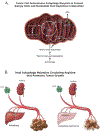Autophagy Regulates Stress Responses, Metabolism, and Anticancer Immunity
- PMID: 34112622
- PMCID: PMC8295230
- DOI: 10.1016/j.trecan.2021.05.003
Autophagy Regulates Stress Responses, Metabolism, and Anticancer Immunity
Abstract
Autophagy is a catabolic intracellular nutrient-scavenging pathway triggered by nutrient deprivation and stress that captures and degrades intracellular proteins and organelles in lysosomes. The breakdown products are then recycled into metabolic pathways to sustain survival. Organelle turnover by autophagy contributes to quality control and suppresses inflammation. Autophagy is upregulated in many cancers and supports their growth, survival, and malignancy in a tumor cell-autonomous fashion. Host autophagy also promotes tumor growth by maintaining a supply of essential nutrients and suppressing innate and adaptive antitumor immune responses. Autophagy is also upregulated in response to cancer therapy and confers treatment resistance. Thus, autophagy is a cancer vulnerability and its inhibition is under investigation as a novel therapeutic approach.
Keywords: T cells; autophagy; cancer; immune response; interferon; metabolism.
Copyright © 2021 Elsevier Inc. All rights reserved.
Conflict of interest statement
Declaration of Interests E.W. is a founder of Vescor Therapeutics and a stockholder in Forma Therapeutics.
Figures




References
-
- Mizushima N and Levine B (2020) Autophagy in Human Diseases. N Engl J Med 383 (16), 1564–1576. - PubMed
-
- Mizushima N (2020) The ATG conjugation systems in autophagy. Curr Opin Cell Biol 63, 1–10. - PubMed
-
- Morishita H and Mizushima N (2019) Diverse Cellular Roles of Autophagy. Annu Rev Cell Dev Biol 35, 453–475. - PubMed
Publication types
MeSH terms
Substances
Grants and funding
LinkOut - more resources
Full Text Sources
Medical

